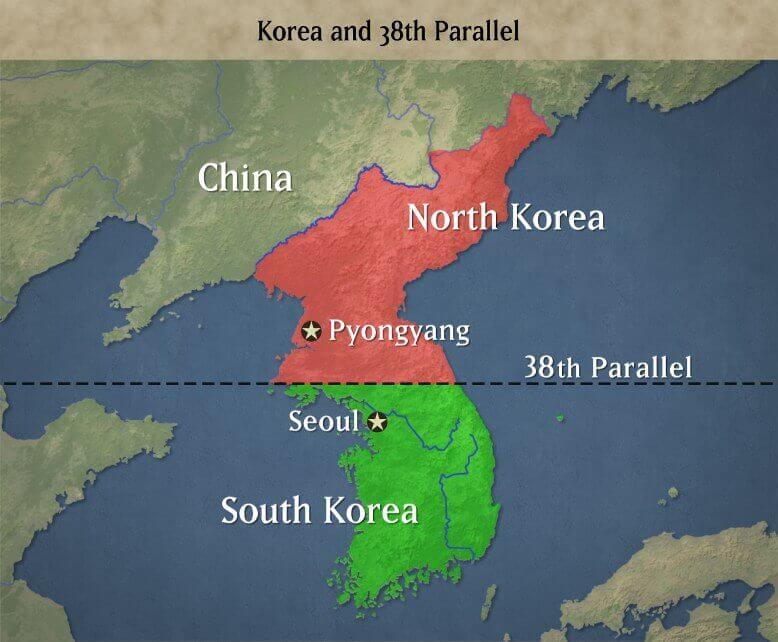International Relations
India's Role in the Korean War
- 03 Apr 2023
- 7 min read
For Prelims: Korean War, Second World War, USSR, UN, Non-Alignment Movement, Russia and Ukraine.
For Mains: India's Role in the Korean War.
Why in News?
During its G20 Presidency Year 2023, India is recalling its diplomatic role in the Korean War seven decades ago.
- India’s role in the Korean War was partially successful, yet India is counted among the countries that contributed to bringing the war to a close.
What is the Timeline of the Korean War?
- Background:
- The root of the conflict lies in the Japanese occupation of Korea between 1910- 1945.
- When Japan was defeated in the Second World War, the Allied forces agreed to establish a “four-power trusteeship over Korea” at the Yalta Conference (1945).
- However, the USSR (Union of Soviet Socialist Republics) invaded Korea and took control of the north while the south remained under the rest of the allies, mainly the USA.
- The division of the two regions was along the 38th parallel north, which still continues to be the official border dividing the two Koreas.
- In 1948, the Republic of Korea (South Korea) and the Democratic People’s Republic of Korea (North Korea) were established.
- As both tried to enhance their reach, territorially and ideologically, the Korean Conflict emerged between the two nations.
- Timeline of the War:
- In 1950, North Korea, backed by the USSR, launched an attack on South Korea and occupied most of the country.
- In response, the United Nations force led by the US retaliated.
- In 1951, the US forces led by Douglas MacArthur crossed the 38th parallel and triggered the entry of China in support of North Korea.
- To prevent further escalation, peace talks began later in 1951.
- India was actively involved in negotiating peace in the Korean peninsula by engaging all the major stakeholders – US, USSR and China.
- In 1952, the Indian resolution on Korea was adopted at the United Nations (UN).
- In 1953, the Korean Armistice Agreement was signed between the UN Command, the Korean People's Army and the Chinese People's Volunteer Army.
- It led to an official ceasefire without a Peace treaty. Thus, the war officially never ended.
- This also led to the establishment of the Korean Demilitarised Zone (DMZ) – a strip of land running across the Korean Peninsula to serve as a buffer zone between North Korea and South Korea.
- In December 1991, North and South Korea signed a pact agreeing to refrain from aggression.
- In 1950, North Korea, backed by the USSR, launched an attack on South Korea and occupied most of the country.
What was India's Role in the Korean War?
- In 1950 Prime Minister Jawaharlal Nehru made a huge diplomatic push to prevent an escalation into another world war, and for the parties to arrive at a quick ceasefire.
- A couple of attempts by India to bring about a ceasefire ended in failure. However, its 1952 proposals for the exchange of prisoners enabled the July 1953 armistice agreement, which marks 70 years this year.
- India proposed a commission to resolve the issue of prisoners of war (PoWs) during talks between the UN and communist sides in 1952, but the proposal was initially shelved. However, when negotiations resumed in 1953, India was selected to chair the Neutral Nations Repatriation Committee, which successfully held PoWs for 90 days and eventually signed the Armistice Agreement on July 27, 1953.
- India has consistently voiced its opposition to North Korean nuclear and missile tests. However, it has maintained a neutral stance regarding sanctions.
- India also sent the 60th Parachute Field Ambulance, which did outstanding work treating more than 200,000 people between 1950 and 1954.
How has been India's Relations with North and South Korea?
- In May 2015, the bilateral relationship with South Korea was upgraded to ‘special strategic partnership’.
- India has a major role to play in South Korea’s Southern Policy under which the latter is looking at expanding relations beyond its immediate region.
- Similarly, South Korea is a major player in India’s Act East Policy under which India aims to promote economic cooperation, cultural ties and develop strategic relationships with countries in the Asia-Pacific.
- India has had diplomatic relations with North Korea for over 47 years, which reflects the legacy of India’s commitment to the Non-Alignment Movement.
Way Forward
- With the post-Covid geopolitical order undergoing major changes and global economic conditions deteriorating, North Korea will want to focus on strengthening its already weak economy, especially when the country has been hit hard by the pandemic.
- Furthermore, at some point, dialogue between North Korea, the United States, South Korea, Japan and other stakeholders on the Korean Peninsula will reopen.
- At that juncture, India would be poised to play a constructive role in promoting peace and security on the Korean Peninsula.
- Continuing India’s engagement with North Korean leadership may pay off in these foreseeable situations.
- In the Current Scenario of War between Russia and Ukraine Indian Prime Minister’s message that “This is not the era of war” has given rise to expectations that India, which often casts itself in the role of “Vishwaguru”, can mediate between Russia and Ukraine to bring the war to an end.





